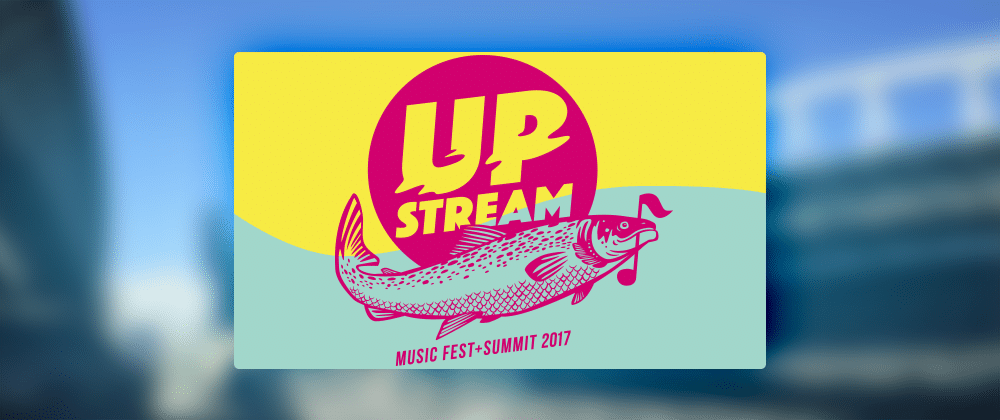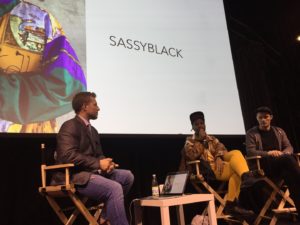Thanks to few strings pulled with Paul Allen, a colleague and I were fortunate enough to attend the Upstream Fest last Friday. Upstream is Seattle’s answer to Austin’s South by Southwest (SXSW), an event that some marketing influencers feel has outlived its usefulness. In other words, SXSW (i.e., Happy Days) has jumped the proverbial shark and Mork & Mindy (i.e., Upstream) is now poised to take its place in America’s collective conscience…and ultimately steal the tastemaker throne from SXSW.
In my opinion, this is purely aspirational on Upstream’s part, considering SXSW has been credited for serving as the launchpad for startups such as Twitter, Foursquare, Periscope (and the poor, poor Meerkat), Gowalla and more. Based on my personal experience with each festival, I’d say Upstream needs a couple of years to prove itself before usurping the top music and tech conference in the world. However, Allen and company definitely established a killer foundation last week.
Some impressions from the inaugural Upstream Fest
- Content is still king. This was the main thrust of every message regarding music and marketing, and the gist of the keynote delivered by Macklemore. It was also the main topic for some of the breakout sessions and panels.
- I own my brand. As a musician, you own your brand, whether you are a duo or a five-piece band. You dictate what happens with it. Most artists are very protective of their brand, and rightfully so. They don’t want anyone messing with their content. Protecting your brand by protecting your content (copyrights) is an essential part of the game, as it establishes your credibility, authenticity, style, etc.
Fortunately, as I learned from Adam Farish, CEO of remix app 8Stem, during his panel discussion with producer and vocalist @Sassyblack_ and the Grammy winning remix artist @RAC, startup companies in the music industry are implementing blockchain technology to assist bands and musicians with the following: licensing and rights management, removing intermediaries from the payment process, and most importantly, mitigating piracy issues. Blockchain is robust. Musicians and bands tired of being ‘taken’ by musical pirates should consider implementing a blockchain strategy immediately.
- I lease my brand. Also emanating from the 8Stem sponsored panel is the concept of leasing one’s brand. Say what? As a musician, how does one go about that process? First, you must realize that there is a benefit to allowing others to sample or remix your content. A great example? RAC, a remix artist who won a Grammy award in 2017 for his remix of a Bob Moses song called Tearing me up. He didn’t just go pirate the content and make a remix — rather some of Bob Moses’ music label reps got in touch with RAC and asked if he would remake Tearing me up in his own vision. And it paid off for both artists!
How did Bob Moses benefit? It’s the classic long tail effect — for some fans, like myself, I heard the RAC remix first and then tracked back to Bob Moses’ original, as I had never even heard of this band. Ever since though, I’ve become obsessed with their work, especially the live version of Tearing Me Up recorded at KEXP radio’s studio in Seattle. I’ll buy anything they produce at this point, largely thanks to RAC.
As many of us understand, the music industry is a broken vehicle right now, disrupted by the evolution of digital technology. It is getting its legs back under it, however, and the future could start to look brighter for a number of underpaid musicians so long as they are paying attention to the business and technology side of the business. If they ignore this advice and try to conduct ‘business as usual’ (playing bars and clubs, and trying to pawn merchandise at shows), they will continue to fail. By understanding the nature of one’s brand and by enhancing that brand through whatever legal means necessary, plus investing in some platforms like BandCamp, the business of being a musician can produce a profit. But that profit is now derived through a ‘death by a million cuts’ strategy as opposed to angling for a big hit.
Upstream has done its duty in showcasing the future of music. Now all it needs to do is replicate this event next year and spend its money wisely on the promotional aspect to drive attendance. Until then, enjoy this foresight of the effect of the digital revolution on the music industry as described by the late, great David Bowie in 1999:


